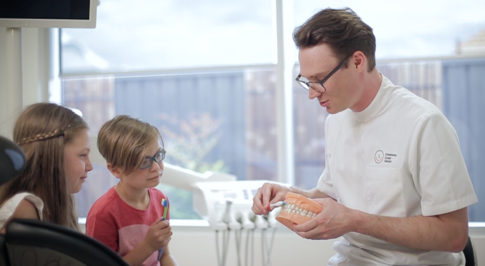
Prevention is always better than the cure, and there is no better argument for this than with the teeth of children.
When children have dental problems there is almost no way of convincing a child to open their mouth for treatment. Some children can understand what needs to be done and can sit still in a chair for treatment, but a good many will refuse. A good Dental Professional will have techniques to coax the child onto the correct path, but some children still won’t have anything to do with it.
The only alternatives for these children is treatment in hospital under general anaesthetic. There are risks associated with general anaesthetic that are inherent, a risk that most parents would rather avoid. Not to mention the cost!
And the entire drama of the events will create an anxiety for the child – the fear of dentists!
We recommend instilling a strong habit of regular teeth brushing for children, the earlier this starts the better, and it needs to be strongly reinforced.
We also recommend coming to see a Dentist or Oral Health Therapist (OHT) regularly from an early age, just don’t wait for there to be a painful problem.
Oral Health Therapists have a special interest in children's dental care.
An examination with a OHT will include
- examination of teeth and gums
- radiographs as appropriate
- oral hygiene instruction
Here are the top 10 tips for children 5-12, taken from the Victorian Department of Health (for more detail we recommend you visit their website - www.dhsv.org.au/dental-advice
1 Use a fluoride toothpaste
- Use low fluoride toothpaste from 18 months to 6 years
- Use standard toothpaste from 6years of age
- Encourage children to spit, but not rinse
2 Brush teeth and gum line 2 x every day, after breakfast and before bed
- Use a toothbrush with a small head and soft bristles
- Brush in a circular motion
3 Drink plenty of tap water
- Fluoride in tap water protects teeth from decay
- Bottled water may not have fluoride in it
4 Children do not need fruit juice or other sweet drinks
- Many fruit and soft drinks contain the double whammy of high acid (softens teeth enamel) and sugar (promotes bacterial growth). A real disaster for dental hygiene.
5 Limit sugary foods
- Particularly bad when combined with irregular brushing
6 Healthy meals and snacks are important for healthy teeth
- Fruits and Vegetables are important
- Also important are Milk, Yoghurt, Cheese - excellent sources of Calcium
- Avoid high sugar snacks
7 Visit the Dentist by the time they go to school
8 Visit the Dentist regularly
- Regular check-ups will spot problems early and the treatment will be easier.
9 See a Dentist as a matter of urgency if your child damages their teeth or face
- If your child knocks out a baby tooth, do not try and put it back in place. Contact your dentist immediately
- Trying to replace a baby tooth can damage the adult tooth underneath the gum, or cause problems when it is time for the baby tooth to fall out
- If a permanent (adult) tooth is knocked out:
- hold it by the crown (smooth white part) and avoid touching the pointy root.
- Gently rinse the tooth with milk or saline without touching the root. Do not scrub the tooth.
- If the person is conscious, you should gently put the tooth back into the socket.
- Hold the tooth in place by getting the person to gently bite on a handkerchief.
- Contact your oral health professional immediately
10 Wear a mouth-guard during contact sport
- Custom fit mouth-guards offer the best protection
